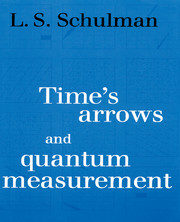Book contents
- Frontmatter
- Contents
- Preface
- 1 Introduction
- 2 Irreversibility
- 3 Arrows of time
- 4 Correlating arrows of time
- 5 Two-time boundary value problems
- 6 Quantum measurements: cats, clouds and everything else
- 7 Existence of special states
- 8 Selection of special states
- 9 Abundance of special states
- 10 Experimental tests
- 11 Conclusions and outlook
- Author index
- Index
10 - Experimental tests
Published online by Cambridge University Press: 05 August 2012
- Frontmatter
- Contents
- Preface
- 1 Introduction
- 2 Irreversibility
- 3 Arrows of time
- 4 Correlating arrows of time
- 5 Two-time boundary value problems
- 6 Quantum measurements: cats, clouds and everything else
- 7 Existence of special states
- 8 Selection of special states
- 9 Abundance of special states
- 10 Experimental tests
- 11 Conclusions and outlook
- Author index
- Index
Summary
In Chapter 6 I presented a proposal for how and why grotesque states do not occur in Nature. In subsequent chapters I explored consequences and found subsidiary requirements, such as Cauchy distributed kicks. To find out whether all or part of our scheme is the way Nature works, we turn to experiment. How to turn to experiment is not so obvious, since the basic dynamical law, ψ → exp(−iHt/ħ)ψ, is the same as for most other theories. Our basic assertion concerns not the dynamical law but the selection of states. Therefore it is that assertion that must be tested. For example, one way is to set up a situation where the states we demand, the ‘special’ states, cannot occur. Then what happens? Another part of our theory is the probability postulate, and this deals not only with the existence of special states but with their abundance. It enters in the recovery of standard probabilities but has far reaching consequences that may well lead to the best tests of the theory. Such tests arise in the context of EPR situations.
The experimental tests fall into the following categories.
Precluding a class of special states. This should prevent a class of outcomes. If the changes in the system (due to precluding the class of special states) do not change the predictions of the Copenhagen interpretation, then this provides a test. In particular, with a class of special states precluded, our theory forbids the associated outcome.
- Type
- Chapter
- Information
- Time's Arrows and Quantum Measurement , pp. 299 - 325Publisher: Cambridge University PressPrint publication year: 1997



